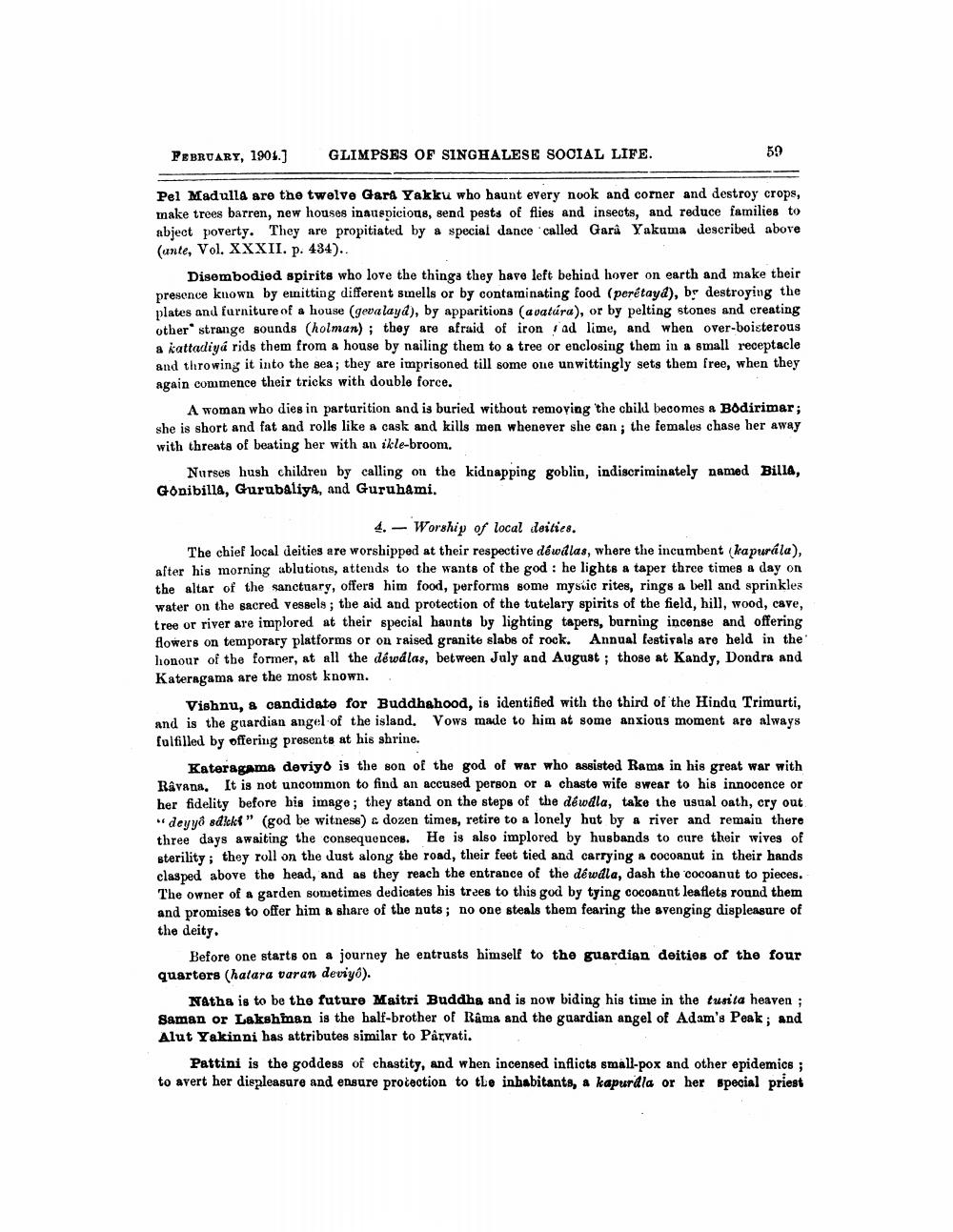________________
PEBRUARY, 1901.)
GLIMPSES OF SINGHALESE SOCIAL LIFE.
59
Pel Madulla are the twelve Gara Yakku who haunt every nook and corner and destroy crops, make trees barren, new houses inauspicious, send pests of flies and insects, and reduce families to abject poverty. They are propitiated by a special dance called Gará Yakuma described above (ante, Vol. XXXII. p. 434)..
Disembodied spirits who love the things they have left behind hover on earth and make their presence known by enitting different smells or by contaminating food (perétayd), be destroying the plates and furniture of a house (gevalayd), by apparitions (avatára), or by pelting stones and creating other strange sounds (holman); they are afraid of iron ad lime, and when over-boisterous a kattadiya rids them from a house by nailing them to a tree or enclosing them in a small receptacle and throwing it into the sea; they are imprisoned till some one unwittingly sets them free, when they again commence their tricks with double force.
A woman who dies in parturition and is buried without removing the child becomes a Bodirimar; she is short and fat and rolls like a cask and kills men whenever she can; the females chase her away with threats of beating her with an ille-broom.
Nurses hush children by calling on the kidnapping goblin, indiscriminately named Billa, Gonibilla, Gurubaliya, and Guruhami.
4.- Worship of local deities. The chief local deities are worshipped at their respective déwdlas, where the incumbent (kapurala), after his morning ablutions, attends to the wants of the god : he lights a taper three times a day on the altar of the sanctuary, offers him food, performs some mystic rites, rings a bell and sprinkles water on the sacred vessels; the aid and protection of the tutelary spirits of the field, hill, wood, cave, tree or river are implored at their special haunts by lighting tapers, burning incense and offering flowers on temporary platforms or on raised granite slabs of rock. Annual festivals are held in the honour of the former, at all the déwdlas, between July and August; those at Kandy, Dondra and Kateragama are the most known.
Vishnu, a candidate for Buddhahood, is identified with the third of the Hindu Trimurti, and is the guardian angel of the island. Vows made to him at some anxious moment are always fulfilled by offering presents at his shrine.
Kateragama deviyo is the son of the god of war who assisted Rama in his great war with Ravana. It is not uncommon to find an accused person or a chaste wife swear to his innocence or her fidelity before his image; they stand on the steps of the déwdla, take the usual oath, cry out "deyyo sdickt" (god be witness) dozen times, retire to a lonely hut by a river and remain there three days awaiting the consequences. He is also implored by husbands to cure their wives of sterility; they roll on the dust along the road, their feet tied and carrying a coconut in their hands clasped above the head, and as they reach the entrance of the déwdla, dash the cocoanut to pieces. The owner of a garden sometimes dedicates his trees to this god by tying cocoannt leaflets round them and promises to offer him a share of the nuts; no one steals them fearing the avenging displeasure of the deity.
Before one starts on a journey he entrusts himself to the guardian deities of the four quarters (hatara varan deviyo).
Natha is to be the future Maitri Buddha and is now biding his time in the tusita heaven; Saman or Lakshman is the half-brother of Rama and the guardian angel of Adam's Peak; and Alut Yakinni has attributes similar to Pârvati.
Pattini is the goddess of chastity, and when incensed inflicts small-pox and other epidemics ; to avert her displeasure and ensure protection to the inhabitants, a kapurdla or her special priest




